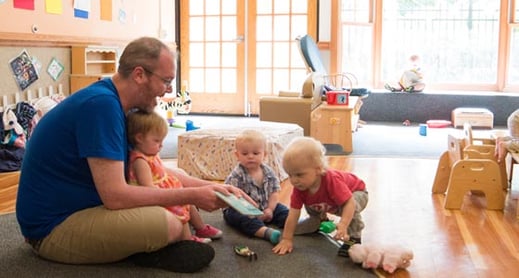
Children need to feel safe before they can explore their surroundings. While curiosity and exploration help awaken children’s talents, teachers help reinforce their learning through guidance and repetition. All children benefit from intentional interactions that inspire them through new experiences—and some children need additional or individualized support.
Given the natural need to be around others, children might have a hard time with social distancing. Organize materials in spaces where two friends can explore together. Make yourself available to facilitate their exploration while ensuring safety.
How to Encourage Inspired Learning in a Socially Distanced Setting
Facilitating Exploration
Classrooms need social distancing measures to remain safe, and children need to feel connected to teachers in order to learn. With safe connections in place, your facilitation is a strong tool for inspiring children.
- Sit safely apart from a child and mirror their actions.
- Narrate what a child is doing and integrate other concepts they have learned.
- When a child says or does something correctly, ask them how they knew it.
Encouraging Persistence
It takes more than one try to learn something new. Repetition is frustrating, especially when safety guidelines have changed the learning environment. By encouraging children to persist, you inspire them to learn.
- Monitor children’s activities and celebrate their efforts.
- Use humor to help children cope when something doesn’t work. Invite them to try again.
- Ask questions to get children thinking about alternative solutions to their work.
Increasing Exposure to Verbal Language
Toddlers’ language skills develop rapidly. You can support them by using a variety of words and engaging them in simple conversations. The more you encourage them, the more you’ll hear them talking each day.
- Talk as often as possible about what you see children doing.
- Engage in any conversations children start about home experiences.
- Ask questions that will require children to give an extended response.
Now that you’ve read some ways to inspire children’s learning in your socially distanced setting, use this planning document to brainstorm how you will inspire your toddlers’ learning in your classroom.
Family members are the child’s first teachers. So caregivers should maintain a close partnership with families. Building a trusting relationship with them helps you take all necessary precautions to keep children and yourself healthy. Whether by phone, email, or text, provide opportunities for each family to share information and ideas about the developmental goals for their child. You can also schedule opportunities to share developmentally appropriate practices at home. Finally, by sharing videos of your classroom interactions, families can see you responding to their needs while inspiring children’s learning.


